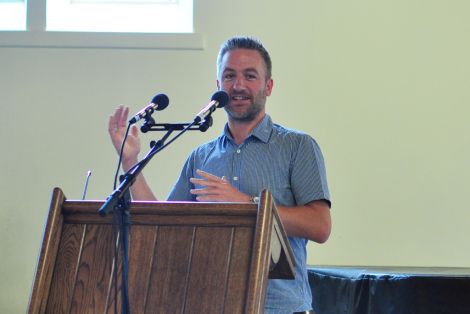Health / Gene variant with higher risk of cancer more common in people with Whalsay heritage, study finds
RESEARCH has estimated that one in 40 people with Whalsay family heritage are likely to have a variant of a gene associated with a higher risk of cancer.
Data from the Viking gene study estimates that people whose four grandparents are from Whalsay are around five times more likely to have the harmful BRCA 2 variant than the wider Shetland population.
The variant is associated with a higher risk of breast and ovarian cancer in women and breast and prostate cancer in men.
A community meeting is taking place at the Symbister Hall in Whalsay this evening at 7pm to allow those behind the Viking study to talk about their findings.
More information and FAQs on the topic can be found here.
The NHS North of Scotland Genetics Service has seen the same variant in the BRCA 2 gene in several families from around Shetland with breast, ovarian and prostate cancer.
The Viking study allowed analysis of how common this gene variant is and where it came from. It found that almost all the people with the gene variant have Whalsay ancestors.
Speaking to Shetland News, Professor Jim Wilson – who leads the University of Edinburgh study – said he would like to see a change in policy where the NHS might be able to provide screenings on a wider level to those affected.
It echoes news last year that a higher instance of a variant of the BRCA 1 gene was linked to the Orkney island of Westray.
The Viking study has been running for a number of years, looking at people with both Shetland and Orkney heritage to study the genetic make-up of islanders.
Professor Wilson explained that around four years ago the researchers were able to take advantage of an upgrade in technology that allowed the team to read many more letters of people’s DNA.
Become a supporter of Shetland News
“One of the first things we looked at were a number of genes that predisposed people to breast, ovarian and prostate cancer,” he said.
“One of the genes is called BRCA 2, and we were surprised to find that it was so common in people from Shetland – particularly in people from Whalsay.
“In general population of the UK something around one in 300 people carry a variant in either BRCA 1 or BRCA 2, but in people who have grandparents from Whalsay it’s one in 40. It’s very much higher, and quite a proportion of the population.”
The professor added that it is the kind of thing which is expected to be found in isolated populations and said the gene will have been passed down through the generations over a number of centuries.
Dr Zosia Miedzybrodzka, professor of medical genetics at the University of Aberdeen and director of the NHS North of Scotland genetic service, said: “Developing cancer is not solely down to carrying the BRCA2 variant, there are many complex factors, and some people with the gene variant will not get cancer.
“However, we know that testing and the right follow-up can save lives. Many people who carry a gene variant are unaware of it. Biological relatives of people with the BRCA2 variant are encouraged to consider being tested.”
A test is currently available to relatives of people with the known BRCA 2 variant as standard NHS care.
People can also request an NHS genetic risk assessment for testing if you have at least one Whalsay born grandparent and:
- have had ovarian, breast or prostate cancer OR
- have a parent, child, sibling, nephew, niece, uncle, aunt or grandparent who has had ovarian, breast or prostate cancer.
Meanwhile a fundraising campaign is underway to enable the Viking genes study to continue.
More information and a donation link can be found here.
Become a supporter of Shetland News
Shetland News is asking its many readers to consider start paying for their dose of the latest local news delivered straight to their PC, tablet or mobile phone.
Journalism comes at a price and because that price is not being paid in today’s rapidly changing media world, most publishers - national and local - struggle financially despite very healthy audience figures.
Most online publishers have started charging for access to their websites, others have chosen a different route. Shetland News currently has over 600 supporters who are all making small voluntary financial contributions. All funds go towards covering our cost and improving the service further.
Your contribution will ensure Shetland News can: -
- Bring you the headlines as they happen;
- Stay editorially independent;
- Give a voice to the community;
- Grow site traffic further;
- Research and publish more in-depth news, including more Shetland Lives features.
If you appreciate what we do and feel strongly about impartial local journalism, then please become a supporter of Shetland News by either making a single payment or monthly subscription.
Support us from as little as £3 per month – it only takes a minute to sign up. Thank you.

















































































